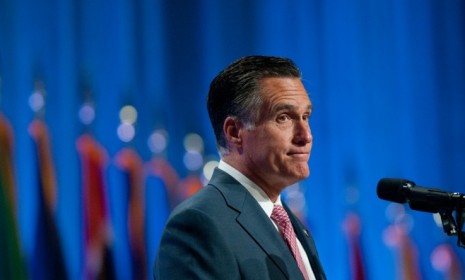Are super PACs a big flop?
Many feared that allowing unlimited donations to outside groups would let the super-wealthy buy elections. Those fears may have been unfounded

A free daily email with the biggest news stories of the day – and the best features from TheWeek.com
You are now subscribed
Your newsletter sign-up was successful
Good-government advocates have worried for years that the Supreme Court's 2010 Citizens United decision, which lifted limits on campaign spending by outside groups, essentially put U.S. elections up for sale to the highest bidder. And a new study by the Sunlight Foundation seemed to confirm those fears, concluding that super PACs spawned by the landmark ruling have accounted for $365 million of the $465 million spent on the presidential campaign and other key races so far this year. (That's 78 percent.) The mountains of cash have certainly bought an unprecedented barrage of negative ads by GOP-friendly groups favoring Mitt Romney, with President Obama's supporters struggling to respond in kind. Still, the ads blanketing swing states don't appear to have had much of an impact, judging by polls. In Pennsylvania and Michigan, for example, Restore Our Future and Americans for Prosperity have spent $18 million trying to make Romney competitive, but he has fallen 8 percentage points behind Obama in both states. Have super PACs fallen flat?
Super PACs are a bust in the presidential campaign: Billionaires might swing some down-ticket races, says Jamelle Bouie at The Washington Post, but they're belly-flopping in the presidential race. There's "a diminishing marginal return to campaign ads — the more you saturate the airwaves, the less effective advertising becomes." Also, being rich doesn't make you smart, and some of these big donors are wasting their millions on politically stupid things, like backing Newt Gingrich.
"Don't sweat the super PAC cash"
The Week
Escape your echo chamber. Get the facts behind the news, plus analysis from multiple perspectives.

Sign up for The Week's Free Newsletters
From our morning news briefing to a weekly Good News Newsletter, get the best of The Week delivered directly to your inbox.
From our morning news briefing to a weekly Good News Newsletter, get the best of The Week delivered directly to your inbox.
They're effective, but not the only game in town: Super PACs "have kept a number of races competitive and put important issues on the table," Steven Law, who directs American Crossroads and Crossroads GPS, tells The Wall Street Journal. But super PACs' ability to make a difference was greatest early on, when the campaigns were struggling to define themselves. Now, with candidates making their own final pitches, "we are no longer the market leader."
"Super PAC influence falls short of aims"
Success or failure, super PACs are definitely wrong: Money "cannot do the job by itself," says Harvey Kronberg at Your News Now, but it's undeniably "a huge predictor of election success." That's why Citizens United, especially with its loopholes allowing billionaires and corporations to donate anonymously to "supposedly social welfare nonprofits," is so dangerous. Maybe this time, as critics say, Romney ran too poor a campaign to benefit from super PACs. But nonetheless, "secret campaign contributions" have no place "in a free and open democracy."
"Secrecy fuels super PACs, but money isn't everything"
A free daily email with the biggest news stories of the day – and the best features from TheWeek.com
Read more political coverage at The Week's 2012 Election Center.
-
 Political cartoons for February 21
Political cartoons for February 21Cartoons Saturday’s political cartoons include consequences, secrets, and more
-
 Crisis in Cuba: a ‘golden opportunity’ for Washington?
Crisis in Cuba: a ‘golden opportunity’ for Washington?Talking Point The Trump administration is applying the pressure, and with Latin America swinging to the right, Havana is becoming more ‘politically isolated’
-
 5 thoroughly redacted cartoons about Pam Bondi protecting predators
5 thoroughly redacted cartoons about Pam Bondi protecting predatorsCartoons Artists take on the real victim, types of protection, and more
-
 The billionaires’ wealth tax: a catastrophe for California?
The billionaires’ wealth tax: a catastrophe for California?Talking Point Peter Thiel and Larry Page preparing to change state residency
-
 Bari Weiss’ ‘60 Minutes’ scandal is about more than one report
Bari Weiss’ ‘60 Minutes’ scandal is about more than one reportIN THE SPOTLIGHT By blocking an approved segment on a controversial prison holding US deportees in El Salvador, the editor-in-chief of CBS News has become the main story
-
 Has Zohran Mamdani shown the Democrats how to win again?
Has Zohran Mamdani shown the Democrats how to win again?Today’s Big Question New York City mayoral election touted as victory for left-wing populists but moderate centrist wins elsewhere present more complex path for Democratic Party
-
 Millions turn out for anti-Trump ‘No Kings’ rallies
Millions turn out for anti-Trump ‘No Kings’ ralliesSpeed Read An estimated 7 million people participated, 2 million more than at the first ‘No Kings’ protest in June
-
 Ghislaine Maxwell: angling for a Trump pardon
Ghislaine Maxwell: angling for a Trump pardonTalking Point Convicted sex trafficker's testimony could shed new light on president's links to Jeffrey Epstein
-
 The last words and final moments of 40 presidents
The last words and final moments of 40 presidentsThe Explainer Some are eloquent quotes worthy of the holders of the highest office in the nation, and others... aren't
-
 The JFK files: the truth at last?
The JFK files: the truth at last?In The Spotlight More than 64,000 previously classified documents relating the 1963 assassination of John F. Kennedy have been released by the Trump administration
-
 'Seriously, not literally': how should the world take Donald Trump?
'Seriously, not literally': how should the world take Donald Trump?Today's big question White House rhetoric and reality look likely to become increasingly blurred